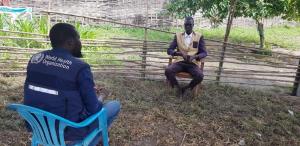Polio expertise steers the COVID-19 response in South Sudan
When fever and body weakness gripped John Achuil, he feared it might be COVID-19. The symptoms were somehow familiar to ignore. The 28-year-old called a hotline number for help.
The rapid response team sent by the Public Health Emergency Operations Center in Rumbek in South Sudan’s Lakes State included an epidemiologist with polio expertise. The team ensured a test sample was collected correctly and taken for testing immediately. Following the positive diagnosis, Achuil was isolated and treated in a designated treatment facility.
“I can’t imagine what could have happened to me. My illness could have deteriorated if the team that came did not know what to do,” the recovered Achuil says. “Probably, I wouldn’t have been alive today.”
Across South Sudan, polio experts have been at the forefront of South Sudan’s COVID-19 pandemic response. Drawing on their experiences in the country’s polio eradication work, more than 300 polio team members are now helping to strengthen disease surveillance in communities and health facilities as well as contact tracing and data management.
For decades, many countries in Africa battled against polio, a vaccine-preventable disease. A heightened attack was mounted in 2014 after the World Health Organization (WHO) declared polio a public health emergency of international concern in several African countries, including South Sudan.
The critical work of the polio response in South Sudan and across the continent led to Africa being declared free of wild polio in August of this year.
Although the polio specialists remain on guard to protect that status (more than 890 000 children younger than 5 years were vaccinated against polio in April and more polio campaigns are planned for later in the year), their know-how was quickly repurposed to contain the spread of COVID-19 even before the first case was reported on 5 April.
“Of course, the disease is different. But the experience, knowledge, and skills we honed while tackling polio can all be used in the fight against COVID-19,” says Dr Andrea Jiel Jiel Dhieu, the WHO polio specialist in Lakes State. “This approach has greatly helped us find, isolate, test, and treat as well as trace and quarantine COVID-19 contacts.”
In working to eradicate polio, South Sudan had to navigate immense challenges that included the displacement of populations, difficult terrain, and accessibility to communities, with air transport the main mode of movement in some areas, which thus increases the operational cost of campaigns and surveillance.
Those same issues challenged what needed to be done to contain the spread of the COVID-19. All the capabilities previously dedicated to polio shifted, and the network of responders from partner organizations and WHO sprang into action with their tried-and-successful systems and tools. Mobile phone applications originally developed for health workers to use in polio outbreak response and disease surveillance, for instance, were adapted to help the polio responders trace COVID-19 contacts.
The inclusion of polio specialists in the rapid response teams helped to enhance prompt case investigations, and contact tracing, while using the opportunity to also enhance surveillance and further detect other epidemic diseases and vaccine preventable outbreaks.
Another impact of the polio expertise in the South Sudan COVID-19 response is the acute awareness for rigorous juggling of attention to all priority diseases despite the necessary and urgent attention to a dominating public health problem.
“COVID-19 continues to cause disruptions in the health sector, and we have to mitigate this,” says Dr Olushayo Olu, WHO Representative for South Sudan. “Our major goal is to support the current COVID-19 response and strengthen in-country capacities while reducing the impact of the disease on other health programmes.”
“The polio team engages with the community to raise awareness about COVID-19 and supports the provision of other health services that may have otherwise have ceased, that include monitoring immunization sessions to ensure standards are adhered to, disease surveillance of not just the vaccine preventable diseases ” explains Dr Sylvester Maleghemi, WHO Team Lead for the Polio Programme.
Achuil learned from the community awareness targeting. He now wears a face mask and washes his hands vigilantly. And he is giving back: On radio talk shows he discusses stigma surrounding COVID-19 and advocates community participation in contact tracing.
“The diligent work of all public health responders has contributed to the country’s mild COVID-19 experience so far, with only 55 deaths reported and 2 817 cases in 24 counties to date, said Dr Olu.



